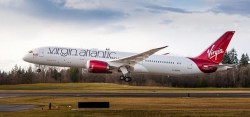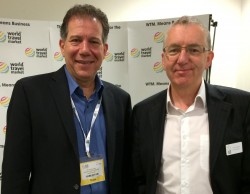It’s hard to believe that when Virgin Atlantic took flight just over thirty years ago in 1984 it operated just one Boeing 747 on one route from London Gatwick to New York Newark. Whereas today it operates a wide body fleet approaching 40 aircraft on a network embracing the North Atlantic, Africa, the Gulf and Asia.
However it has by no means been a fairy tale rags to riches story: In recent years the company has seen meagre profitability at best – and heavy losses at worst. The new man at the helm, CEO Craig Kreeger faces tough challenges if he is to turn the business around.
Virgin’s network diversity has been part of the problem with its presence in some markets too thin to support profitability. Once daily frequencies in markets like London to Sydney or Tokyo were not enough amid intense competition. The lack of short haul feed at Virgin’s main Heathrow base has been another challenge made worse when British Midland was acquired by IAG. Virgin failed to overcome this problem by setting up its own Little Red domestic operation which it will abandon next year.
On top of this, the now ended shareholding by Singapore Airlines wasn’t a match made in heaven and Virgin’s fleet still includes a sizable chunk of older fuel guzzling Boeing 747’s and Airbus A340’s. The once proud marketing slogan “four engines for long haul” is now outdated in a world of efficient long haul twins such as the 777 And A330.
Craig Kreeger has his work cut out but the stars may be aligning in his favour. I’ve met him a number of times and I interviewed him for the recent World Travel Market. He’s a man of much experience, capable of drawing on this for calm reflection. He believes he has “the coolest job in the industry”.
Kreeger arrived at the airline not long after Virgin had promulgated its new shareholder relationship with Delta (49%), that looks a lot more coherent than the old partnership with Singapore Airlines. There are advantages for both Virgin and Delta, playing to their respective strengths in Heathrow and the US market. And it seems certain that having an American national as CEO will assist Virgin in navigating any cultural difference with its Trans Atlantic shareholder cousins.
Kreeger has already tackled some thorny issues including slimming and restructuring his management team and closing a number of Virgin’s thinner routes to refocus on its core strength, the Atlantic market from which the airline takes its name.
He is down to earth and doesn’t see room to simply “fall in love with the stuff you do” – saying he has little time for airlines that talk about strategic routes. “Strategic, actually, is a euphemism for loses a lot of money”. This approach makes a lot of sense, allowing both airlines to better exploit their market position out of Heathrow and to reap Delta’s massive US domestic presence to feed the Trans Atlantic services. This also deftly overcomes the failure of Little Red. With Delta as a partner, Virgin is now much less reliant on feed from UK domestic points.
Kreeger shows an entrepreneurial flair, believing there is a need to take calculated risks and learn positive lessons from failure. He wants to encourage a spirit of innovation and forward planning.
Virgin’s fleet is well into the renewal phase with a growing number of twin Airbus A330’s already in service and the first of the next generation Boeing 787-9’s recently received. These will significantly improve the cost base and operating dynamics.
With a new shareholder, new CEO and new fleet, there’s much good news for Virgin Atlantic. But with its base in London the airline still has to face up to the capacity gridlock which grips the UK’s southeast.
Bringing an American perspective, Kreeger sees it as “…an amazing failing of the UK to this point, to recognise the role that aviation can play, in developing tourism and business linkages…to some extent it’s taken for granted”.
He believes that the UK needs a single large hub at Heathrow but sees any possibility of a new runway there being at best, in the distant future, joking that “I’m hoping actually to just be alive”.
The next set of financial results will show what progress Kreeger and Virgin Atlantic have made so far. Who knows what’s in the stars but at least the skies now look clear enough for Virgin to see the light.

Leave a Reply